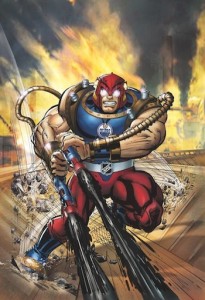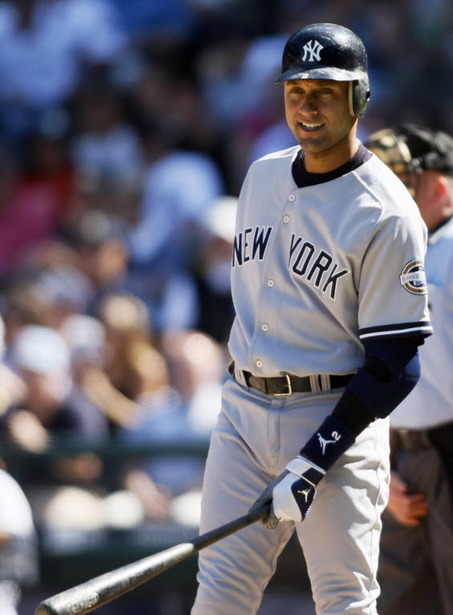The NHL’s Guardian Project is a misstep
The National Hockey League’s All-Star Weekend has come and gone, generally creating a positive buzz for professional hockey in North America.
The All-Star Fantasy Draft, where captains Eric Staal and Nicklas Lidstrom selected their superstar teams schoolyard style, was a huge success, averaging 600,000 viewers in the United States.
Unfortunately, the lingering product from the gala event in Raleigh N.C. is the Guardian Project, the NHL’s misguided attempt at drawing in today’s youth.
The Guardian Project is a marketing campaign where legendary comic book creator Stan Lee designs super heroes based off the names of all 30 NHL franchises.
Sounds good in theory, but in practice the idea plays out like a super villain’s hare-brained scheme. Stan Lee + comic books + hockey teams + ???? = world domination.
In other words, it’s not very well thought out.
The NHL Guardians are problematic from their very conception. First, Stan Lee simply doesn’t have as much cultural cache as he once did. After all, he hasn’t had a monthly title since Ravage 2009 in the early 1990s. You know, when the Guardian Project’s target demographic was still years away from being born.
Second, the characters themselves are lame. Witness Chris Sims of ComicsAlliance epic takedown: The Ten Most Insane Characters From Stan Lee's 'NHL Guardians'.
Many of the characters seem to be based on a brief skimming of each franchise’s Wikipedia page. Important details like the military heritage of the Chicago Blackhawks and Toronto Maple Leafs aren’t touched on at all.
Most importantly, the NHL’s marketing department is once again playing away from the game’s strengths.
Hockey is one of North America’s oldest sports, with the NHL’s Original Six predating any National Basketball Association franchise, only a handful of National Football League teams and most Major League Baseball clubs.
It’s a disgrace that the Montreal Canadiens, a franchise that is over 100 years old and a cornerstone of Quebecois society, is being represented by the likes of this:
But campaigns like Project Guardians relies on trendy thinking that makes the NHL seem newer than the Arena Football League or other shaky niche sports.
Seriously – the Tampa Bay Storm of the Arena Football League predate the Tampa Bay Lightning by five years. The Charlotte Rage were created and folded before the Carolina Hurricanes moved from Hartford, Conn. The list goes on and on.
Commissioner Gary Bettman and the rest of the powers that be at the NHL have to learn that if they really want to make inroads in the Sun Belt, they need to educate and inform their new fanbase about the rich history and tradition of the game, not disregard it.
Otherwise, the NHL comes off as just the latest in a long line of failed sporting enterprises.
That’s why innovations like the All-Star Fantasy Draft and the Winter Classic have been so successful: because they are reminiscent of the history and tradition of hockey.
It’s also why the NHL’s Guardians Project was a dreadful misfire: it glosses over one of the most appealing aspects of hockey.
Major League Baseball needs to adjust its clocks
Although I’m just 26-years-old there are times when I feel old and curmudgeonly. Recently, my complaints have been directed at Major League Baseball’s handling of “event” games, whether they are the World Series, the World Baseball Classic, the All-Star Game or Opening Day.
All of these rather significant baseball games start way too late, they’re filled with time-consuming theatrics and the play itself seems to move at an incredibly slow pace. It makes me feel like an old crank shaking his walking cane at those damn kids who won’t get off my lawn.
However, NorthJersey.com reported Thursday morning that at least two MLB umpires - Joe West and Angel Hernandez – agree with me.
The two officials are members of the crew that have been calling the opening series between the Boston Red Sox and New York Yankees.
“They’re the two clubs that don't try to pick up the pace,” said West in the article. He is the chief of the umpiring crew and was behind home plate on Sunday. “They’re two of the best teams in baseball. Why are they playing the slowest?”
“It’s pathetic and embarrassing. They take too long to play.”
Amen, Joe West. Amen.
Hernandez refused three requests for timeouts during Tuesday night’s game. New York’s Derek Jeter, Marcus Thames and Boston's David Ortiz were all denied a pause from the ‘action’.
Despite West and Hernandez’s efforts to quicken their glacial pace, the Yankees and Red Sox first two games clocked in at 3 hours and 46 minutes and 3 hours and 48 minutes.
Maybe baseball players don’t have to work the next morning, but most people do. How is baseball supposed to cultivate a new audience of young fans when any responsible parent would be sending their kids to bed hours before these games lumber to an end? How are the paying customers expected to sit through nearly four hours of slow play?
Commissioner Bud Selig must find a way to curb these seemingly interminable games. Broadcasters must be haemorrhaging viewers with these lengthy match-ups and in the long run it’s going to shrink baseball’s market share.
Selig should move the time of the game up. Both games in the New York-Boston series were slated to start at 8 p.m. Eastern Daylight Time. How about moving the opening pitch up to 7 p.m.? At least that way the game will end on the same day, barring extra innings.
That’s another thing – when I say “opening pitch”, I do mean the first throw of the game. Not a fly over by the Air Force, the unfurling of a gigantic flag in the outfield or a performance by Jay-Z and Alicia Keys. If you must have all that pageantry, start it at 6 p.m. with the game itself beginning an hour later.
I know that this would effectively cut the West Coast off, but does Selig really want to be developing Yankee and Red Sox fans in California? Shouldn’t they be cheering for the five teams they already have?
Also, the most important part of any sporting event is the final result, and the Pacific Time Zone won’t be robbed of that. A Californian baseball fan who gets off work at 5 p.m. would only be missing the first half of the game.
Major League Baseball is famous for being slow to adapt to change, but enforcing a more reasonable time frame for their games is a pressing concern that Bud Selig should address sooner rather than later. After all, the clock is ticking.


